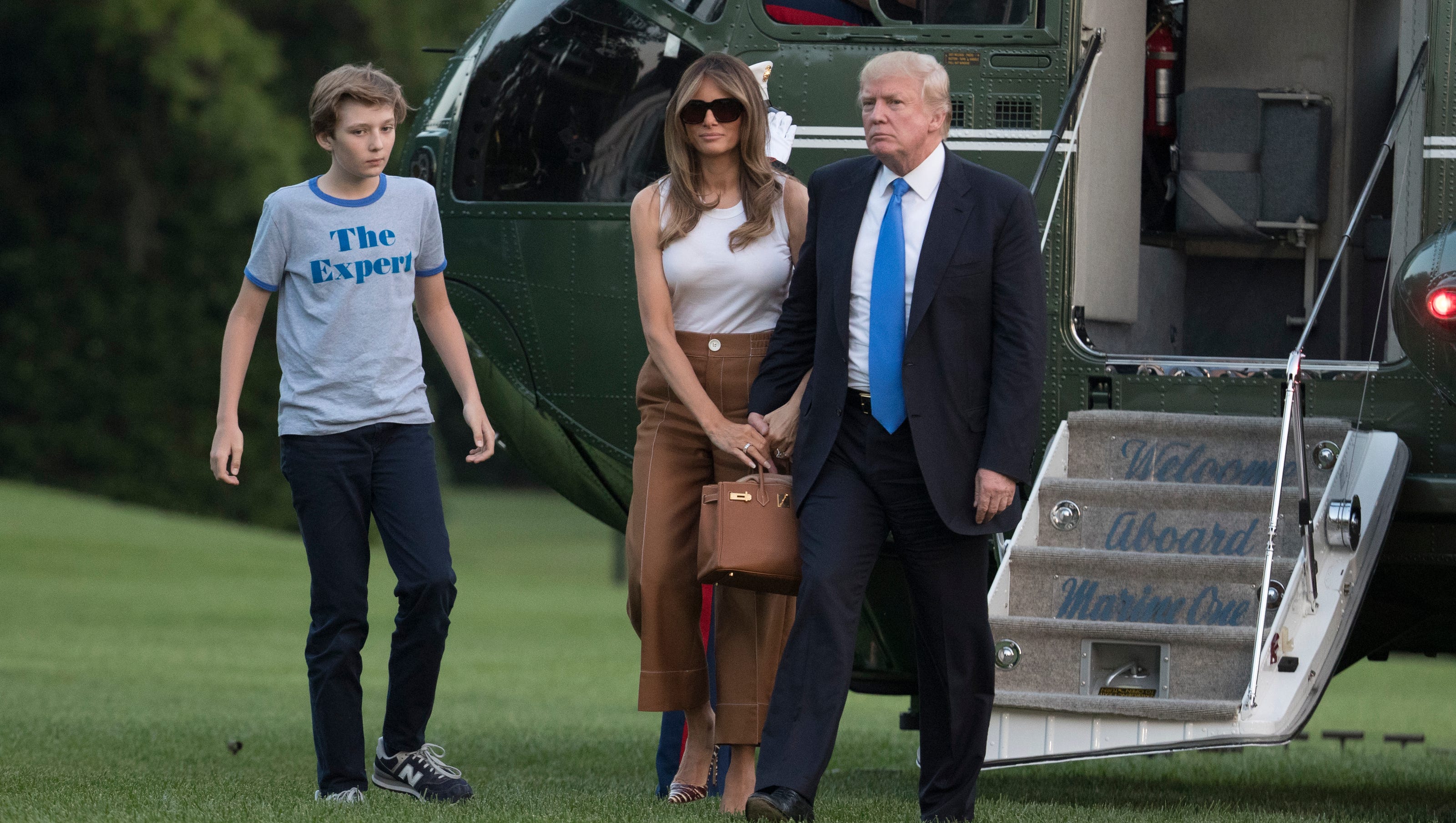Is Barron Trump Autistic? Unraveling The Truth Behind The Speculations
Barron Trump, the youngest child of former U.S. President Donald Trump and First Lady Melania Trump, has often been the subject of public curiosity and media speculation. Among the many rumors surrounding him, one that has gained significant attention is whether Barron Trump is autistic. This question has sparked debates, with some pointing to his behavior in public appearances and others dismissing the claims as baseless. As discussions around neurodiversity become more mainstream, it’s crucial to address this topic with sensitivity, accuracy, and a focus on factual information.
Born on March 20, 2006, Barron Trump has grown up in the public eye, navigating life as the son of one of the most high-profile political figures in modern history. While his parents have maintained a protective stance regarding his personal life, the lack of detailed information has fueled speculation. Some observers have pointed to his reserved demeanor during public events, while others have highlighted his unique communication style as potential indicators of autism. However, without official confirmation or credible evidence, these remain assumptions at best.
In this article, we will explore Barron Trump’s life in detail, from his biography and family background to the speculations about his neurodiversity. We aim to provide a balanced perspective by addressing common questions, examining credible sources, and offering insights into autism and its portrayal in the media. By the end, readers will have a clearer understanding of the topic and the importance of respecting privacy while discussing sensitive issues like Barron Trump is autistic.
- Is Chumlee From The Pawn Stars Still Alive
- Did Cameron Boyce Have A Sister
- Joe Rogan Wife Ufc
- Coach Freeman Wife
- Billy Joel Diet
Table of Contents
- Barron Trump Biography: A Glimpse into His Life
- Personal Details and Bio Data of Barron Trump
- Is Barron Trump Autistic? Examining the Speculations
- What Is Autism? Understanding the Condition
- How Does the Media Influence Public Perception of Barron Trump?
- What Role Does Family Support Play in Neurodiversity?
- Why Is It Important to Discuss Neurodiversity Responsibly?
- Frequently Asked Questions About Barron Trump and Autism
Barron Trump Biography: A Glimpse into His Life
Barron Trump was born in New York City and is the only child of Donald Trump and Melania Trump. As the youngest member of the Trump family, he has lived a life that blends luxury, privilege, and the challenges of growing up in the public eye. From a young age, Barron has been exposed to high-profile events, political campaigns, and media scrutiny, which has shaped his unique upbringing.
Despite his family’s prominence, Barron has largely stayed out of the spotlight, with his parents ensuring he leads as normal a life as possible. He attended private schools, including the prestigious St. Andrew’s Episcopal School in Maryland, where he pursued academics and extracurricular activities. His reserved nature and limited public appearances have often led to curiosity about his personality and behavior, including the question, “Is Barron Trump autistic?”
As Barron continues to grow into adulthood, his life remains a topic of interest for many. However, it is essential to approach discussions about him with empathy and respect for his privacy. Below is a table summarizing his personal details and bio data:
- Nadal V Kyrgios
- John Lott Economist
- Movie Splash Actress
- Who Is David Muir S New Partner
- Is Carrie Underwood Liberal
| Full Name | Barron William Trump |
|---|---|
| Date of Birth | March 20, 2006 |
| Place of Birth | New York City, New York, U.S. |
| Parents | Donald Trump (Father), Melania Trump (Mother) |
| Education | St. Andrew’s Episcopal School, Potomac, Maryland |
| Notable Traits | Reserved demeanor, limited public appearances |
Is Barron Trump Autistic? Examining the Speculations
The question “Is Barron Trump autistic?” has circulated widely in media and public discourse. Autism, a neurodevelopmental condition characterized by differences in social communication and behavior, affects individuals in unique ways. Some observers have speculated that Barron’s quiet and introspective nature during public events might align with traits commonly associated with autism. However, these assumptions lack concrete evidence and can perpetuate stereotypes.
Why Do People Think Barron Trump Is Autistic?
Several factors have contributed to the speculation about Barron Trump’s neurodiversity:
- Public Appearances: Barron’s limited interactions with the media and reserved demeanor have led some to question whether he exhibits signs of autism.
- Behavioral Observations: Certain mannerisms, such as avoiding eye contact or displaying repetitive behaviors, have been noted by observers.
- Lack of Information: The Trump family’s decision to keep Barron’s personal life private has fueled curiosity and unfounded assumptions.
What Does the Evidence Say?
It is important to note that no official statement or credible source has confirmed that Barron Trump is autistic. Diagnosing someone based on public behavior or media appearances is both unethical and inaccurate. Autism is a complex condition that requires a comprehensive evaluation by qualified professionals. Speculating about someone’s neurodiversity without evidence can lead to misinformation and harm.
What Is Autism? Understanding the Condition
Autism spectrum disorder (ASD) is a developmental condition that affects how individuals perceive the world and interact with others. It is called a “spectrum” because it encompasses a wide range of symptoms and abilities. Some individuals with autism excel in specific areas, such as mathematics or art, while others may face challenges with communication or social skills.
What Are the Common Signs of Autism?
While autism manifests differently in each person, some common signs include:
- Difficulty with social interactions, such as making eye contact or understanding social cues.
- Repetitive behaviors or routines, such as hand-flapping or lining up objects.
- Intense focus on specific interests or topics.
- Sensitivity to sensory stimuli, such as loud noises or bright lights.
How Can We Support Individuals with Autism?
Creating an inclusive environment for individuals with autism involves understanding their unique needs and strengths. This includes providing access to therapies, fostering acceptance, and promoting neurodiversity in all aspects of society.
How Does the Media Influence Public Perception of Barron Trump?
The media plays a significant role in shaping public opinion, and Barron Trump’s case is no exception. Headlines and social media posts often amplify rumors and speculations, contributing to a narrative that may not align with reality. By focusing on unverified claims, such as whether Barron Trump is autistic, the media can inadvertently perpetuate stigma and misinformation.
What Responsibilities Does the Media Have?
Responsible journalism requires accuracy, sensitivity, and respect for privacy. When reporting on public figures like Barron Trump, the media should avoid sensationalism and prioritize factual information. This is especially important when discussing topics like neurodiversity, which require nuanced understanding and empathy.
What Role Does Family Support Play in Neurodiversity?
Family support is crucial for individuals with autism and other neurodivergent conditions. A nurturing and accepting environment can significantly impact a person’s well-being and development. For Barron Trump, his family’s protective stance suggests a commitment to providing him with a stable and supportive upbringing.
How Can Families Foster Acceptance?
Families can promote acceptance by educating themselves about neurodiversity, advocating for their loved ones, and creating spaces where individual differences are celebrated. This approach not only benefits the individual but also contributes to a more inclusive society.
Why Is It Important to Discuss Neurodiversity Responsibly?
Neurodiversity is a concept that recognizes and values the differences in how people’s brains work. Responsible discussions about neurodiversity help combat stigma, promote understanding, and create opportunities for inclusion. When it comes to public figures like Barron Trump, responsible dialogue ensures that conversations remain respectful and informed.
How Can We Encourage Positive Conversations?
Encouraging positive conversations involves listening to neurodivergent voices, challenging stereotypes, and using language that empowers rather than marginalizes. By focusing on strengths and contributions, we can shift the narrative toward acceptance and celebration of diversity.
Frequently Asked Questions About Barron Trump and Autism
Is Barron Trump Autistic?
There is no official confirmation or credible evidence to suggest that Barron Trump is autistic. Speculations about his neurodiversity are based on assumptions and lack factual support.
Why Do People Speculate About Barron Trump’s Neurodiversity?
Speculations arise due to Barron’s reserved demeanor, limited public appearances, and the media’s tendency to focus on unverified claims. However, it is essential to approach such discussions with sensitivity and respect for privacy.
How Can We Promote Autism Awareness?
Promoting autism awareness involves educating the public, challenging stereotypes, and supporting initiatives that foster inclusion and acceptance. Organizations like Autism Speaks provide valuable resources for learning more about autism and neurodiversity. Learn more here.
Conclusion
While the question “Is Barron Trump autistic?” continues to generate interest, it is crucial to approach the topic with empathy, respect, and a commitment to accuracy. By focusing on facts rather than assumptions, we can contribute to a more informed and inclusive society. Whether Barron Trump is autistic or not, the broader conversation about neurodiversity highlights the importance of understanding, acceptance, and support for all individuals.
Article Recommendations
- Nail Designs For Almond Shape Nails
- Iconic 1970s
- Empire State South Atlanta Ga
- Luke Combs Brother Died
- Joe Rogan Wife Ufc


Detail Author:
- Name : Ezequiel Ebert
- Username : qschumm
- Email : rlindgren@yahoo.com
- Birthdate : 2005-10-30
- Address : 10567 Fay Meadow New Ramiroborough, SC 22177
- Phone : (458) 829-2417
- Company : Breitenberg LLC
- Job : Cashier
- Bio : Blanditiis sunt veniam molestiae rerum error accusamus nemo non. Expedita et temporibus qui accusamus repellat vel. Quas quia harum consequatur est vitae vero ea sunt.
Socials
twitter:
- url : https://twitter.com/rippin2020
- username : rippin2020
- bio : Magni reiciendis aut necessitatibus. Exercitationem tenetur sint ipsa consequatur. Et beatae quas vero architecto iusto eos.
- followers : 4069
- following : 226
facebook:
- url : https://facebook.com/ruby_id
- username : ruby_id
- bio : Omnis sapiente quia molestiae aliquid aut.
- followers : 3297
- following : 2410
tiktok:
- url : https://tiktok.com/@rippinr
- username : rippinr
- bio : Sunt qui ab et mollitia blanditiis. Autem hic dolorem provident voluptatem.
- followers : 1708
- following : 2156
instagram:
- url : https://instagram.com/rrippin
- username : rrippin
- bio : Rerum eligendi laborum magni. Est voluptas odio atque praesentium.
- followers : 6936
- following : 2387